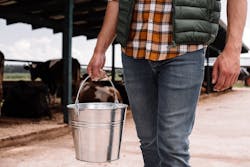American farmers are dumping milk, throwing out eggs, and plowing under crops they know they will not be able to afford to harvest and ship. Reports like these seem to come from economic histories or political arguments of the past, but that’s because they make a point that’s simple to understand — or, perhaps, impossible to understand.
You may hear of the farmers’ dilemma and conclude: “That makes sense. Why waste the effort and resources?” Or, you may say: “This is crazy. Why should food be wasted when there is hunger and need?” Both of these are credible responses I admit I could make, depending on my circumstances. Or, depending on my convictions or expectations, or aspirations. There are two basic ways to view this situation and innumerable responses and reasons for those responses.
I don’t need to explain why this report has emerged now and not from the past, because now everything that everyone does or thinks about is premised on preservation, self-preservation. They’re destroying crops to preserve their livelihoods.
Everything has to be reexamined according to what we know or think we know about viral infection. Like air or water, infection or immunity to it is the essence of everything. We may draw different conclusions about it but we’re all starting from a common reality.
Eastern and Western intellectuals, from ancient times right up to the Medieval Age, identified air, water, earth, and fire as the four elements of nature, and Greek philosophy added to this a fifth element, “aether”, to describe otherwise inexplicable things like gravity or the movement of light, or the spark of life. Modern English relies heavily on scientific definitions for this sort of discussion, and refers to “elements” as things in their pure forms, such as hydrogen or carbon elements. But that fifth element is with us still through Medieval French when refer to the quintessence of something – the pure and unalterable form. So, by extension, everything and everyone has some essential quality.
Recent decades have given us many opportunities to question what is or is not essential. Science and technology have been used to alter or overcome many barriers that ordinary life encounters. Commerce has found innumerable ways to alter long-held assumptions about who or what is essential to a business or a community.
“Essential” has been getting a lot of use lately as we set aside all other objectives to contain the spread of a global pandemic. It was widely agreed by late March that preserving life is essential, more valuable than profit or even income. This was a surprise to me, as I had come to believe (and write on many occasions) that material reward had become the prime directive of 21st century life, and commerce had become our basic individual right.
In March, “essential” meant someone or something was necessary to preserving life, regardless of other risks. Business that did not have “essential” status petitioned to gain it. Producers of non-essential products like cars and aircraft strained their efforts to produce essential things like ventilators. Being non-essential at least brought the solace of knowing we could be kept safe.
But in April, “non-essential” meant something less. If we cannot individually determine that our lives are essential to us, than what is the value of life? What began as fully voluntary compliance now has millions of us asking the cost of our isolation, and if we may be allowed to define our own essential status. People have different intuitions about their own essential qualities, what makes him or her distinct. A farmer knows his work and what makes it essential. A barber, or painter, or cashier has a different sense of what makes himself or herself valuable. A business producing cast parts has a method for defining the value of its products to other businesses and individuals.
If in the past we exaggerated the importance of material reward, we have had a rare chance to correct that miscalculation by choosing as a whole to value and preserve life. In the weeks and months ahead we will have to reaffirm what is valuable, what is essential, and reevaluate how much risk to assume as we allow individuals to reclaim their own essential status.
About the Author
Robert Brooks
Content Director
Robert Brooks has been a business-to-business reporter, writer, editor, and columnist for more than 20 years, specializing in the primary metal and basic manufacturing industries. His work has covered a wide range of topics, including process technology, resource development, material selection, product design, workforce development, and industrial market strategies, among others.
